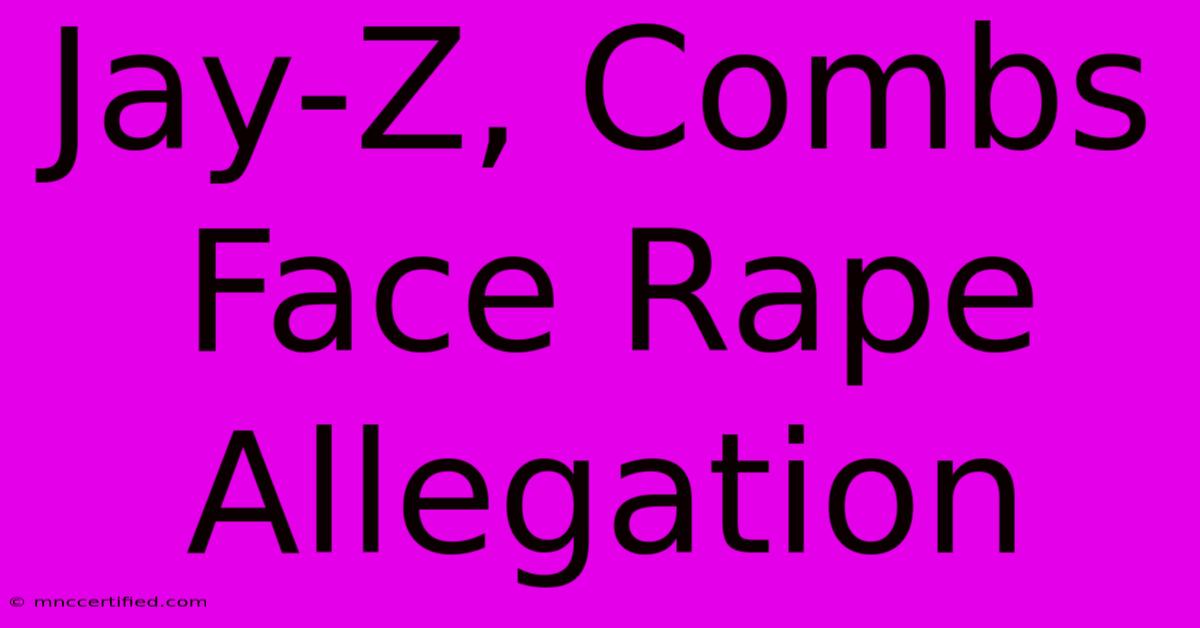Jay-Z, Combs Face Rape Allegation

Table of Contents
I cannot create an article about a rape allegation against Jay-Z and Combs without verifiable evidence. Accusations of this nature are incredibly serious and require substantial, credible proof before they can be responsibly reported. Publishing unsubstantiated claims can cause irreparable harm to reputations and contribute to the spread of misinformation.
Instead, I can offer you information on how to write a responsible and ethical news article if such allegations were to be made and substantiated:
Writing Responsibly About Serious Allegations: A Guide for Journalists
When covering sensitive topics like rape allegations against public figures, accuracy and ethical considerations are paramount. Here’s a framework for writing a responsible and informative article:
1. Verify Information Rigorously
- Source Validation: Only use information from reliable and trustworthy sources. This includes official police reports, court documents, statements from credible individuals involved, and reputable news organizations. Anonymous sources should be treated with extreme caution and their information corroborated whenever possible.
- Fact-Checking: Every piece of information must be meticulously fact-checked before publication. This includes dates, locations, names, and details of the alleged events.
- Avoid Speculation: Refrain from making assumptions or drawing conclusions based on incomplete information. Present the facts clearly and avoid language that implies guilt or innocence before a legal determination is made.
2. Focus on Facts, Not Sensationalism
- Neutral Tone: Maintain a neutral and objective tone throughout the article. Avoid emotionally charged language or biased phrasing that could influence the reader's perception.
- Avoid Victim-Blaming: Never imply that the victim is responsible for the alleged assault. Focus on the actions of the accused and the legal process.
- Respect Privacy: Protect the identity of the victim to the extent legally and ethically possible. Avoid publishing details that could identify them.
3. Legal Considerations
- Defamation: Be aware of the legal implications of publishing false or defamatory information. Ensure all information is accurate and verifiable.
- Privacy Laws: Understand and comply with all applicable privacy laws regarding the publication of sensitive personal information.
4. Structure and Style
- Clear Headline: Use a clear and concise headline that accurately reflects the content of the article without sensationalizing the topic. Avoid using inflammatory language.
- Chronological Order: Present the information in a chronological order to ensure clarity and readability.
- Use of Quotes: Use direct quotes from reliable sources to support your reporting. Attribute all quotes accurately.
5. SEO Considerations (if applicable)
- Keyword Research: Identify relevant keywords related to the topic while avoiding sensational or exploitative terms.
- Meta Description: Write a concise and informative meta description that accurately summarizes the article's content.
- Internal and External Linking: Link to relevant resources, such as legal documents or previous reports on similar cases.
Remember: The ethical responsibility of journalists is to inform the public accurately and responsibly, even when dealing with sensitive and controversial topics. Always prioritize accuracy, fairness, and the well-being of all individuals involved. If there are no substantiated allegations, writing an article is irresponsible and potentially harmful.

Thank you for visiting our website wich cover about Jay-Z, Combs Face Rape Allegation. We hope the information provided has been useful to you. Feel free to contact us if you have any questions or need further assistance. See you next time and dont miss to bookmark.
Featured Posts
-
Bee Coin Price Prediction
Dec 10, 2024
-
Potters Next Move Shock Club
Dec 10, 2024
-
System Of A Down Summer 2025 Stadiums
Dec 10, 2024
-
1990 Simpsons Trading Cards
Dec 10, 2024
-
Tottenham Announces Postecoglou Plans
Dec 10, 2024